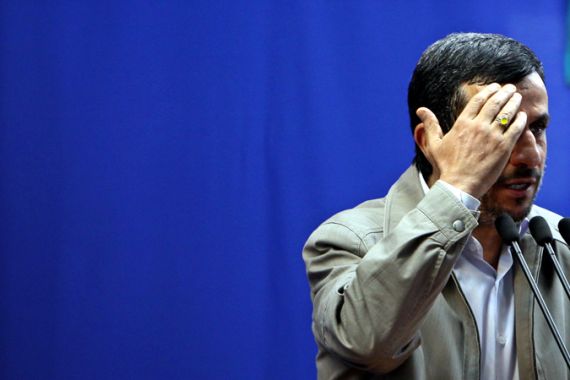Israel’s self-fulfilling prophecy on Iran
Another round of Middle East confrontation involving Israel may kick-start after the latest IAEA report.

 |
| Although the Israeli army has only been practicing for Iranian missile launches, it could make an Iranian attack a reality if Israel chooses to pre-emptively strike militarily against them [Reuters] |
MADRID, SPAIN – With the release of the IAEA’s indicting report into Iran’s nuclear activities, the starting gun for another round of Middle East confrontation involving Israel has gone off. The report, coming at a time of de-stabilising change across the region, threatens to transform a low-level, proxy conflict between Israel and Iran into a more violent and direct confrontation.
Since the discovery of a secret Iranian nuclear facility at Natanz a decade ago, Israel and the West have engaged in a shadow war against Iran involving implicit threats, muscle flexing, convoluted diplomacy and intelligence intrigues. Reacting to Tehran’s bellicose anti-Zionist rhetoric, Israeli politicians have repeatedly said they would not tolerate a nuclear-armed Iran. Ever since, the shadow of a military intervention against the Islamic Republic has hung over the world like a dark sceptre.
But so far, Israel has refrained from launching a very risky operation, choosing instead to deter Iran and stymie its ability to produce nuclear weapons. Indeed, the latest smoke signals of war coming from Israel could be part of its strategy to frighten Tehran. But with the IAEA report, and a quickly morphing political situation in the region, it may be that Israel is turning a corner in its resolve to finally act.
The local context has changed considerably for Israel. The Arab spring has shattered all assumptions and threatens decades-old alliances. Symbolic but meaningful gains by the Palestinians at the UN have compounded Israel’s sense of powerlessness and uncertainty. As Palestinians gain ground on the world stage and old Arab allies become strangely indecipherable, the more tangible issue of Iran makes for an alluring diversion – and a reassertion of primacy.
Some Arab Sunni leaders are deeply fearful of Iran’s regional ambitions, and may be giving quiet nods of approval to a strike that would hobble the Shia giant across the Gulf – even from Israel. Moreover, Israel may act while the United States is still in Iraq. An Iranian retaliation against American targets there could draw a reluctant USA indirectly into war – a salient Israeli objective.
Despite these calculations, an attack on Iran will come at terrible cost of lives and destruction on both sides. Those who claim Iran is a paper tiger will not be in the direct line of fire in Iran, Lebanon, Iraq, and Israel. The damage will not just be material. The positive spirit of the Arab revolutions, focused on practical not ideological goals, will be swept away in the aftershocks. Indeed, any future Iranian anti-regime protest movement will be trumped by national anger against the attack.
The great irony is that this will be a self-fulfilling prophecy: instead of pre-emption and prevention, the attack will ensure decades of Iranian search for a nuclear option aimed at attacking Israel. In other words, Israel will have traded the mere possibility of an attack for its certainty.
Most damaging of all, this war will mean yet another turn of the cycles of violence in the Middle East. The strike, another trauma forged more deeply into Middle Eastern memory, will provide another reason for Arabs to hate Israel. Today’s nods of support will rapidly turn into recriminations as Arab leaders will be forced to respond to their newly empowered publics demands for justice against Israeli aggression – and the killing of Muslims.
There is another way forward for the region, away from more trauma. It begins, but does not end, with the creation of a Palestinian state. The formative trauma between Israel and the Arabs was in Palestine in 1948. Its resolution will not dissolve all the problems with Iran, but it will cut off anti-Israeli sentiments at the pass, and point to fresh and healthy ground.
Many Israelis shirk at any link between the Palestine issue and Iran. But, the Middle East is much more of an inter-related and dynamic organism that many in the West or Israel care to perceive. History and dignity count much more than some care to admit.
This tough decision to go to fresh ground is unappealing to politicians. Instead, reassertion of control amidst shocking change, and misperceptions from the past threaten to rule the day. We saw it happen after 9/11 in Iraq, and the current events may well mean war, and decades of healing unnecessary – and possibly fatal – wounds.
John Bell is Director of the Middle East Programme at the Toledo International Centre for Peace in Madrid and John Zada is a freelance journalist based in Toronto.